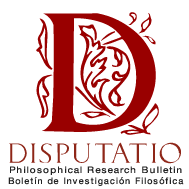Pedro Blas González
Barry University, USA | gonz7750@bellsouth.net
Received: 20-November-2018 | Accepted: 20-December-2018 | Published: 31-December-2018
Disputatio [Dec. 2018], Vol. 7, No. 8, a006 | DOI: 10.5281/zenodo.2550964
Article | [EN] | Full Text | Statistics | Copyright Notice [es] | Vol. 7 No. 8
How to cite this article:
Blas González, Pedro (2018). «Ortega y Gasset’s Philosophy of History ». Disputatio. Philosophical Research Bulletin 7, no. 8: a006.
Abstract | According to Ortega, human history comes about as the discovery of differentiated, self-aware life that encounters itself in a reservoir of possibilities. Properly speaking, history does not exist until man, who is a metaphysical/existential entity, becomes aware of responsibility in choice-making. For this reason, human history signifies more than just historical events. Instead, history is the outward manifestation of the trajectory of personal life, either as ensimismamiento or alteración. In Toward a Philosophy of History, Ortega explains history as a vital process that originates in the exuberance of free will. In Ortega’s thought, history is the domain of metaphysical/existential beings, and not the culmination of a “blind” process. Ortega’s philosophy of history locates history-making in the choices of individuals through vital reason. This is what he ultimately means by historical reason. Abstraction, he suggests, revolts against life.
Keywords | Philosophy of History · Philosophy of Existence · Vital Reason · Historical Reason · History as Free Will.
![]()
La filosofía de la historia de Ortega y Gasset
Resumen | Según Ortega, la historia humana sucede como el descubrimiento de una vida diferenciada, consciente de sí misma, que se halla a sí misma en una alcancía de posibilidades. Hablando propiamente, la historia no existe hasta que el hombre, que es una entidad metafísica/existencial, se da cuenta de la responsabilidad al tomar decisiones. Es por esto que la historia humana tiene un significado más grande que meros eventos históricos. En vez de esto, la historia es la manifestación externa de la trayectoria de la vida personal, ya sea como ensimismamiento o como alteración. En Historia como sistema, Ortega explica la historia como un proceso vital que tiene su origen en la exuberancia del libre albedrío. En el pensamiento de Ortega, la historia es el dominio de seres metafísicos/existenciales y no la culminación de un proceso «ciego». La filosofía de la historia de Ortega ubica el hacer de historia en las elecciones de los individuos a través de la razón vital. Es esto a lo que él se refiere a fin de cuentas con «razón histórica». La abstracción, sugiere, se rebela contra la vida.
Palabras Clave | Filosofía de la historia · Filosofía de la existencia · Razón Vital · La razón histórica · La historia como libre albedrío.
References
Girard, René (1988) To Double Business Bound: Essays on Literature, Mimesis, and Anthropology. Baltimore: The Johns Hopkins University Press.
Ortega y Gasset, José (1932). The Revolt of the Masses. New York: W.W. Norton & Company.
Ortega y Gasset, José (1941). Toward a Philosophy of History. Urbana: W.W. Norton & Company.
Ortega y Gasset, Jose (1962) History as a System and Other Essays Toward a Philosophy of History. New York: W.W. Norton & Company.
© The author(s) 2018. This work, published by Disputatio [www.disputatio.eu], is an Open Access article distributed under the terms of the Creative Commons License [BY–NC–ND]. The copy, distribution and public communication of this work will be according to the copyright notice. For inquiries and permissions, please email: boletin@disputatio.eu.
